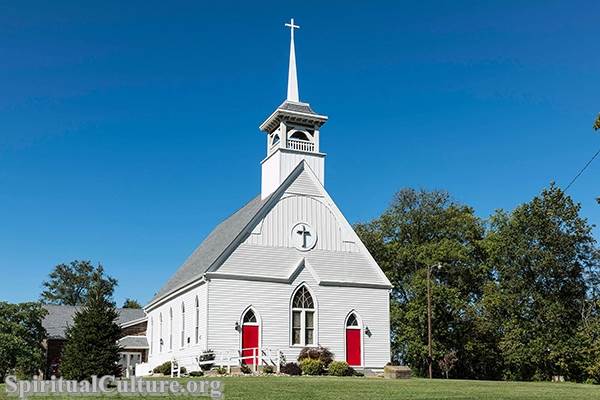Salvation: the word itself stirs the deepest longings of the human heart. To be rescued, redeemed, made whole. Across history, humanity has yearned to know: Am I right with God? Am I secure forever? In the Protestant tradition, these questions are met with bold, tender answers rooted in Scripture and grace.
Today, Spiritual Culture invites you to walk this sacred path—to understand how Protestants view salvation and the assurance that flows from it. Whether you seek clarity, hope, or a new beginning, may this journey speak to your spirit.
Salvation: A Gift, Not a Wage
Rooted in Grace, Not Works
At the heart of Protestant belief is the conviction that salvation is entirely a work of God’s grace. It cannot be earned, merited, or bought through human effort. It is an unmerited gift from a loving God to a fallen humanity.
The Apostle Paul wrote:
“For it is by grace you have been saved, through faith—and this is not from yourselves, it is the gift of God—not by works, so that no one can boast.” (Ephesians 2:8-9, NIV)
Here, grace is not a cooperative project between God and humanity; it is God’s initiative and completion. It is the outpouring of divine mercy toward those who could never save themselves.
The Role of Faith
Faith, in the Protestant understanding, is the open hand that receives the gift. It is trust—not merely intellectual assent, but a wholehearted reliance on Christ’s finished work on the cross.
Martin Luther, a key figure in the Reformation, declared:
“Faith is a living, daring confidence in God’s grace, so sure and certain that a man could stake his life on it a thousand times.”
Thus, salvation is not “faith plus works” or “faith plus feelings,” but faith alone (sola fide), resting solely on Christ alone (solus Christus).
The Cross and Resurrection: Foundation of Salvation
The Substitutionary Atonement
Central to Protestant salvation theology is the belief that Jesus died as a substitute for sinners. He bore the penalty that humanity deserved, satisfying divine justice and opening the way for reconciliation.
As Isaiah prophesied centuries before:
“But he was pierced for our transgressions, he was crushed for our iniquities; the punishment that brought us peace was on him, and by his wounds we are healed.” (Isaiah 53:5, NIV)
The cross is not merely a demonstration of love; it is the means by which salvation was secured.
Victory Over Death
The resurrection of Christ is equally vital. Protestants believe that Jesus’ resurrection is the definitive proof that death and sin were defeated.
Paul exults:
“If Christ has not been raised, your faith is futile; you are still in your sins.” (1 Corinthians 15:17, NIV)
Thus, salvation is not a vague hope but a historical certainty anchored in the empty tomb.
Assurance: Can I Know That I Am Saved?
Confidence, Not Presumption
One of the most tender questions many souls ask is: Can I truly know I am saved? In Protestant teaching, the answer is a resounding yes—not based on personal worthiness, but on God’s promises.
John writes:
“I write these things to you who believe in the name of the Son of God so that you may know that you have eternal life.” (1 John 5:13, NIV)
Assurance, therefore, is not arrogant presumption. It is humble confidence in the reliability of God’s Word and work.
The Witness of the Spirit
Protestants also affirm that the Holy Spirit bears inner witness to the believer’s adoption into God’s family.
Paul speaks of this mystery:
“The Spirit himself testifies with our spirit that we are God’s children.” (Romans 8:16, NIV)
This inner testimony does not always manifest as overwhelming emotion but as a growing peace and trust in Christ.
Fruits of Salvation: Evidence, Not Cause
Good Works as Response
Protestants emphasize that while good works do not cause salvation, they inevitably flow from it. A transformed heart produces transformed living.
James echoes this truth:
“Faith by itself, if it is not accompanied by action, is dead.” (James 2:17, NIV)
Thus, works are not a ladder to heaven; they are the fruits of a heart rooted in grace.
Sanctification: The Journey of Growth
Sanctification—growing in holiness—is seen as the natural outworking of salvation. It is the lifelong process by which believers are conformed to the image of Christ.
Protestants affirm that God, who begins the work of salvation, will bring it to completion:
“Being confident of this, that he who began a good work in you will carry it on to completion until the day of Christ Jesus.” (Philippians 1:6, NIV)
The Protestant Diversity: Nuances Among Traditions
Reformed and Calvinist Views
Some Protestants, especially in Reformed and Calvinist traditions, emphasize the perseverance of the saints—that true believers will inevitably continue in faith until the end, because God preserves them.
Jesus affirmed:
“My sheep listen to my voice; I know them, and they follow me. I give them eternal life, and they shall never perish; no one will snatch them out of my hand.” (John 10:27-28, NIV)
Wesleyan and Arminian Views
Others, like those in the Wesleyan or Arminian traditions, believe that genuine believers must actively abide in faith and that apostasy (falling away) is possible.
Hebrews warns:
“See to it, brothers and sisters, that none of you has a sinful, unbelieving heart that turns away from the living God.” (Hebrews 3:12, NIV)
Thus, while salvation is always by grace through faith, there are nuances in how assurance and perseverance are understood.
How This Belief Shapes Life
Freedom from Fear
Knowing salvation is a gift frees the believer from the exhausting treadmill of trying to “be good enough.” Life becomes a response of gratitude rather than a performance for acceptance.
Empowered Living
Assurance fuels boldness. A soul confident in Christ dares to love extravagantly, serve joyfully, and endure trials steadfastly.
Humble Witness
Understanding salvation by grace creates humility, not pride. The saved soul becomes a gentle witness, inviting others to experience the same free gift.
Reflect and Reimagine
Salvation, in the Protestant heart, is the story of grace breaking into brokenness, of God rescuing the helpless, of love triumphing over sin and death.
If you are wondering today, Can I be saved? Can I be sure?—the answer from Protestant faith is simple and profound: Believe in the Lord Jesus, and you will be saved (Acts 16:31).
You are invited to lay down striving, to trust the pierced hands that beckon you, and to find assurance not in your grip on God, but in God’s grip on you.
Spiritual Culture encourages you to contemplate: What would it look like to live, not in fear of losing salvation, but in joy at having been found?
In Christ, salvation is not a distant hope. It is a present gift. And assurance is not a wishful feeling. It is a Spirit-breathed certainty.
Rest in it. Rejoice in it. Reflect it to the world.





